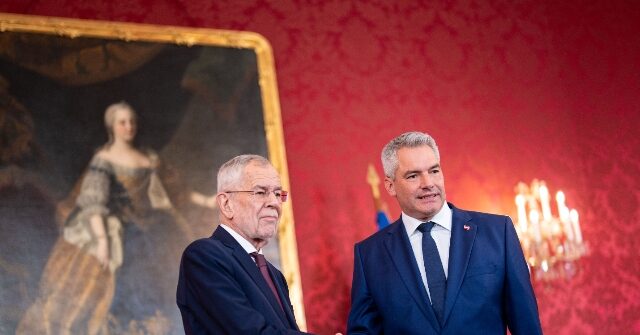In Austria, a significant political development has transpired following the recent elections, where the populist Freedom Party of Austria (FPÖ) emerged victorious with 29% of the vote. However, contrary to established political norms, the party will not have the opportunity to form a government. This unprecedented decision was formally announced by Austrian President Alexander Van der Bellen, who has opted to grant incumbent Chancellor Karl Nehammer of the Austrian People’s Party (ÖVP) the chance to form a new government, despite his party finishing in second place with 26% of the vote. The move reflects a deviation from tradition, as it is customary in many democratic systems for the party that wins the most votes to be given the first opportunity to lead.
The President’s rationale for this unusual decision hinges on the reluctance of other political parties to collaborate with the FPÖ, which is known for its strong anti-mass migration stance. Even Chancellor Nehammer, who leads a center-right party, has denounced the Freedom Party, labeling its leader, Herbert Kickl, as a “conspiracy theorist.” Consequently, the only plausible route left for Nehammer involves forging a coalition with left-leaning parties, particularly the Social Democrats (SPÖ). However, this partnership alone would yield a slim majority in parliament, compelling Nehammer to seek additional support from either the liberal-focused New Austria and Liberal Forum (NEOS) or the environmentally driven Green Alternative (GRÜNE).
In the face of being sidelined following electoral success, Herbert Kickl, the leader of the FPÖ, expressed his determination and resilience. He acknowledged that the decision to exclude his party from government might be perceived as a “slap in the face” to many of its supporters. Nonetheless, Kickstarter emphasized the threshold of change that voters indicated in the elections, framing it as a mandate for fresh leadership and renewal in Austria. He reiterated the FPÖ’s commitment to actively engage with the political process while striving to address pressing issues facing the nation, asserting that the party’s goals are aligned with the electorate’s will.
The reaction from former FPÖ leader Heinz-Christian Strache reflects a growing sentiment among populist supporters. Strache posits that the establishment’s decision to circumvent the FPÖ is likely to backfire and rally further support for the party, sparking predictions of future electoral success, characterized as another “blue wave”—a reference to the party’s color. He speculates that Herbert Kickl may transform into a political martyr within this context. By becoming the primary opposition against the establishment coalition, Kickl is positioned to enhance the stature and appeal of the FPÖ, overtly countering the traditional parties that have opted to exclude them.
Moreover, the implications of these political dynamics echo beyond mere electoral strategies; they touch upon broader themes of governance and representation in contemporary Austria. By sidelining the FPÖ, President Van der Bellen and other party leaders may inadvertently deepen societal divides, as a significant portion of the electorate has expressed support for the populist agenda. The act of forming a coalition excluding the victor of the elections raises questions about democratic principles and the nature of political responsibility, as it suggests that the voices of a substantial electorate may be overlooked in favor of maintaining established power structures.
In conclusion, the political landscape in Austria remains in flux following the recent elections, marked by the sidelining of the Freedom Party despite its electoral success. With President Van der Bellen’s controversial decision, Chancellor Nehammer now faces the challenge of forming a government with leftist parties, which could lead to significant shifts in Austria’s political climate. As leaders like Kickl and Strache rally their base around this perceived injustice, the FPÖ may leverage this moment to position itself as a formidable opposition party, potentially reshaping Austria’s political identity in the coming years. The unfolding situation underscores both the fragility of party alliances and the resilience of populist movements in the face of institutional resistance.

